Clearbit Alternatives
Find your Clearbit replacement. We compare 10 alternatives based on data quality, features, and pricing to help you make the right choice.

Clearbit is a well-known tool, and for good reason. Many businesses use it for data enrichment or to build a B2B database. It performs well when you need to find company details or understand the technology a prospect uses.
However, some users report occasional data inaccuracies or outdated contacts. To help, we analyzed the best alternatives based on G2 reviews, comparing their pros and cons against Clearbit to help you shortlist your options. Let's get started.
Consider 11x for Digital Sales Workers
If your team is exploring digital workers for sales tasks, consider 11x. The platform provides autonomous agents to manage parts of your sales process. This is a different approach from standard data enrichment tools and may fit certain operational goals.
11x provides a GTM platform that uses AI agents to manage sales processes. An agent named Alice finds prospects and runs outreach, while Julian qualifies inbound leads and books meetings. The platform unifies data enrichment, outreach, and warmup functions, replacing multiple tools in a GTM stack.
Clearbit Alternatives
The following section provides a detailed analysis of each Clearbit alternative. We examine pricing, core features, and the specific pros and cons of each tool when compared directly to Clearbit.
1) ZoomInfo SalesOS
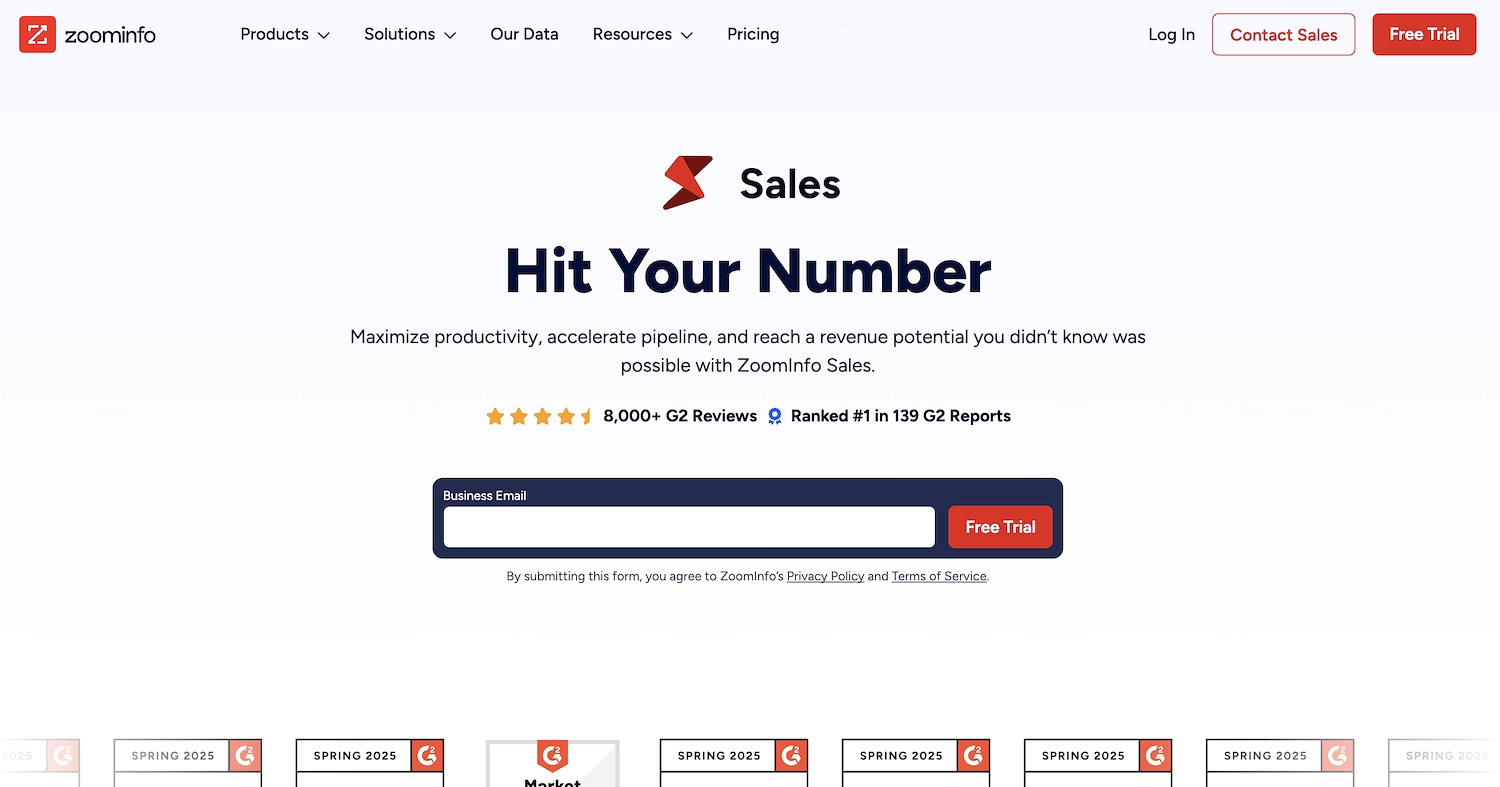
ZoomInfo SalesOS is a revenue platform for B2B companies. It offers a large contact database with verified emails and direct-dial phone numbers. The tool supports data enrichment with real-time firmographic and technographic data to maintain CRM hygiene.
It also identifies prospects through buyer intent signals and analysis of anonymous website visitors. Sales, marketing, and RevOps teams use the platform to find and engage potential buyers based on these insights.
ZoomInfo SalesOS's Main Features
- Tracks companies researching solutions like yours to engage them at the earliest stage of the buyer’s journey.
- Identifies anonymous site visitors and surfaces the decision-makers behind the clicks with the WebSights feature.
- Analyzes calls, meetings, and emails using Conversation Intelligence to understand deal drivers and refine sales processes.
- Builds multi-touch cadences with an integrated dialer and email outreach using the Sales Automation feature.
ZoomInfo SalesOS vs. Clearbit: A Comparison
Average Review score: 4.5/5 stars based on 8,738 G2 reviews.
- ZoomInfo SalesOS includes sales automation to build multi-touch cadences with an integrated dialer. Clearbit does not offer this, as it focuses on data enrichment.
- The platform tracks buyer intent signals when companies research solutions. This offers an earlier engagement point than Clearbit, which provides mainly firmographic data.
- It offers Conversation Intelligence to analyze calls and emails for deal insights. This feature helps refine sales processes, an area outside of Clearbit's core functions.
- Its database provides direct-dial phone numbers and verified emails. While Clearbit also has contact data, ZoomInfo's is often noted for its size and inclusion of direct contact lines.
Where ZoomInfo SalesOS May Fall Short
- Some users report that ZoomInfo's contact data can occasionally be outdated. In comparison, Clearbit's specific focus on real-time enrichment may result in more current information.
- The platform is a comprehensive suite with sales automation and call intelligence. For teams that only need data enrichment, Clearbit presents a more focused and simpler solution.
- Clearbit is often noted for its flexible, developer-friendly API for custom integrations. ZoomInfo's broad platform might present a steeper learning curve for similar bespoke tasks.
Pricing and Cost-Effectiveness
ZoomInfo SalesOS pricing is available by quote, similar to Clearbit, and both are considered high-cost solutions. Based on user reviews, Clearbit may offer a faster return on investment at 11 months compared to ZoomInfo's 14 months. You will need to contact their sales teams for specific pricing details.
2) Apollo.io
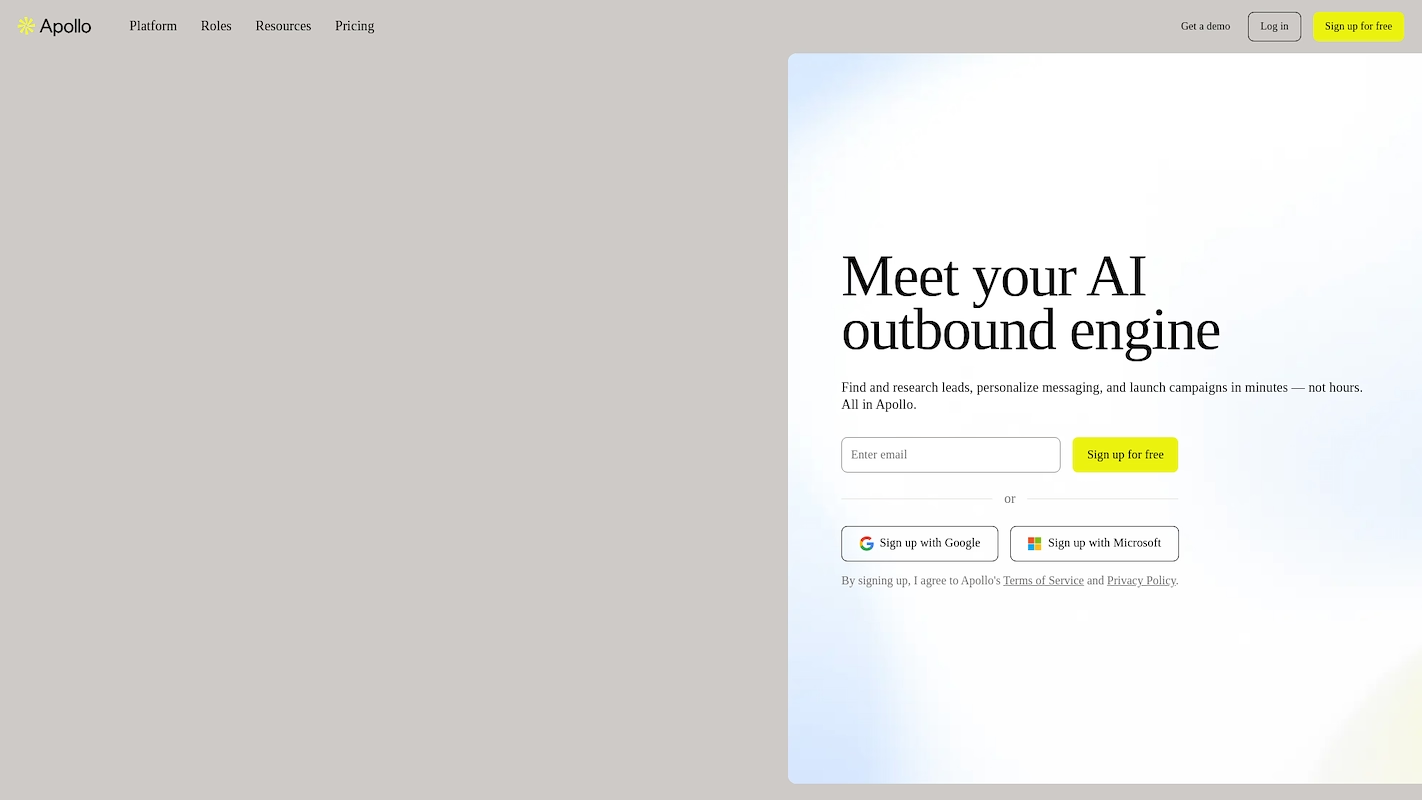
Apollo.io is a sales intelligence platform with a large B2B database. It helps teams find contact and company data. The platform offers data enrichment and technographics to understand a prospect's technology stack. It also includes an email finder to source contact details for sales outreach.
Apollo.io's Main Features
- Builds automated outreach sequences that combine emails, calls, and LinkedIn tasks.
- Sources verified email addresses to support direct sales outreach efforts.
- Provides analytics on sequence performance, including open, click, and reply rates.
- Notifies you when saved contacts change jobs to help identify new opportunities.
Apollo.io vs. Clearbit: A Comparison
Average Review score: 4.7/5 stars based on 8,904 G2 reviews.
- Apollo.io combines data enrichment with sales outreach tools in one platform, whereas Clearbit focuses primarily on data enrichment.
- It includes a sales engagement suite to build automated outreach sequences. This is a function that Clearbit does not offer.
- The tool provides job change notifications for saved contacts to create timely sales triggers, a feature different from Clearbit's company-level data updates.
- Apollo.io offers a free plan and transparent pricing, which makes it more accessible compared to Clearbit's quote-based model.
Where Apollo.io May Fall Short
- Some users report that Apollo.io's contact data can be less accurate than Clearbit's. This may happen because Clearbit focuses solely on real-time data enrichment, while Apollo.io is a broader sales platform.
- For teams that need custom data workflows, Clearbit offers a more flexible, developer-friendly API. In comparison, Apollo.io is an all-in-one system, which might present limitations for highly specific integrations.
- Its platform includes a full suite of sales engagement tools. For teams that only require data enrichment, Clearbit presents a simpler, more focused solution without the additional features that might complicate workflows.
Pricing and Cost-Effectiveness
Apollo.io offers transparent pricing with a free plan and paid tiers starting at $49 per user per month, making it a predictable option for teams with fixed budgets. Clearbit uses a custom quote-based model, which may better suit large enterprises. For the most current information, check the pricing on Apollo.io's official website.
3) Lusha
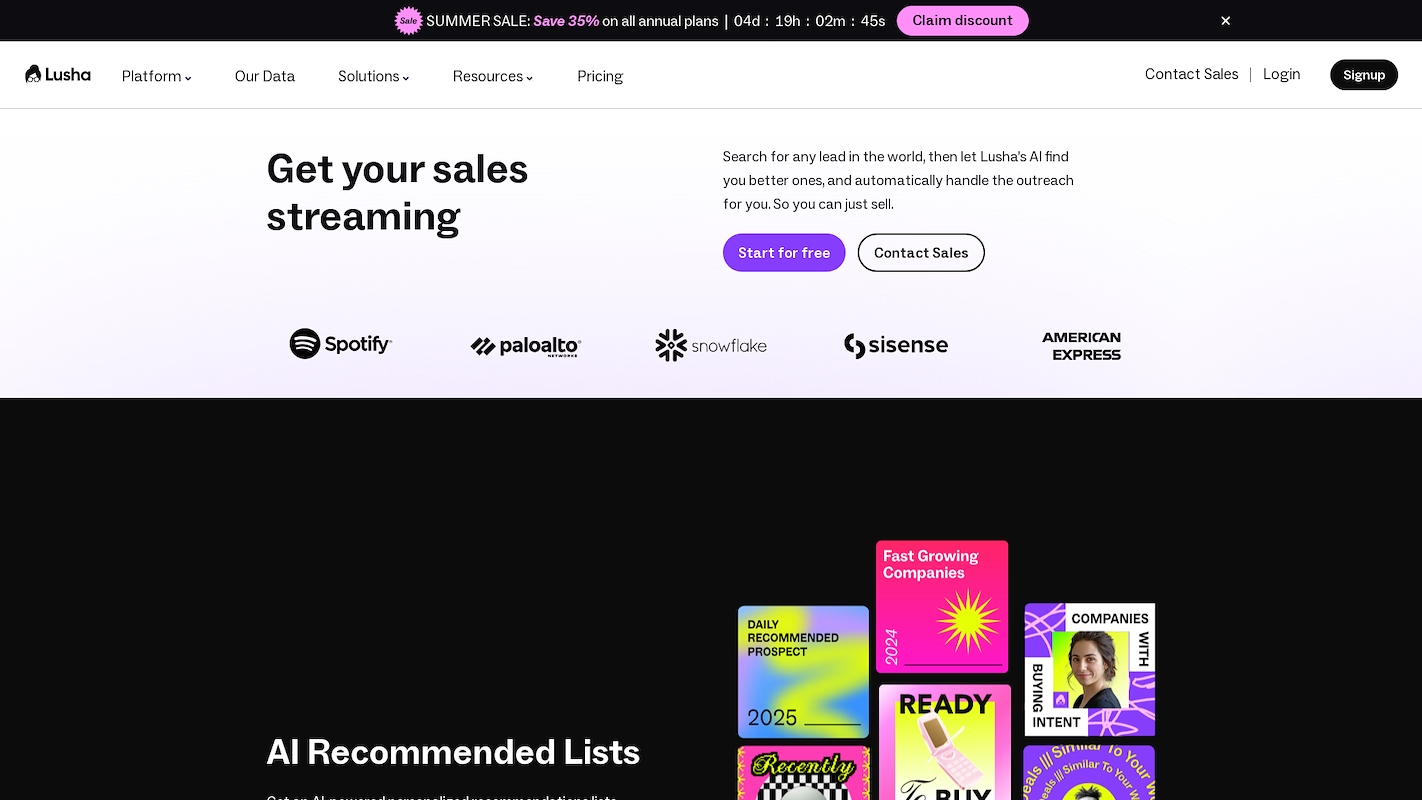
Lusha is a sales intelligence platform for B2B lead searches. It provides AI-generated prospect recommendations and automates outreach. The platform emphasizes global data coverage and compliance with GDPR and CCPA.
Teams use it to build prospect lists, get new leads, and enrich CRM records. It integrates with sales tools through native connectors and an API to keep data current and support outreach efforts.
Lusha's Main Features
- Receives daily, ICP-based lists of companies and decision-makers from an AI recommendation engine.
- Spots in-market buyers and provides real-time notifications on intent triggers.
- Automates and personalizes email sequences with AI-driven copy.
- Records and analyzes sales meetings to identify key insights.
Lusha vs. Clearbit: A Comparison
Average Review score: 4.3/5 stars based on 1,516 G2 reviews.
- Lusha uses an AI engine to create daily lists of new prospects based on your ideal customer profile. This automates the list-building process, while Clearbit focuses on data enrichment for specific queries.
- The tool identifies in-market buyers and sends real-time notifications on intent triggers. This offers a proactive way to find leads, whereas Clearbit primarily provides firmographic data on demand.
- It includes features to automate and personalize email sequences with AI-generated copy. Clearbit does not have built-in outreach capabilities, as its main purpose is data enrichment.
- The platform offers a free plan and transparent monthly pricing. This provides more predictable costs for smaller teams compared to Clearbit's custom, quote-based model.
Where Lusha May Fall Short
- Some users report that Lusha's data can be less current. In comparison, Clearbit focuses on real-time data enrichment, which may provide more up-to-date information for fast-moving accounts.
- For teams that need custom data workflows, Clearbit provides a more flexible API. Some Lusha users note gaps in its CRM integration, which might limit complex, bespoke setups.
- Its credit-based system may limit access to certain data points, like phone numbers. Clearbit's pricing is based on overall usage, which can be more suitable for high-volume data needs.
Pricing and Cost-Effectiveness
Lusha provides transparent pricing with a free plan and paid tiers starting at $36 per user per month, which is suitable for teams needing predictable costs. In contrast, Clearbit uses a custom quote-based model, often better for large enterprises with specific data volume requirements. For detailed pricing, visit Lusha's official website.
4) Hunter
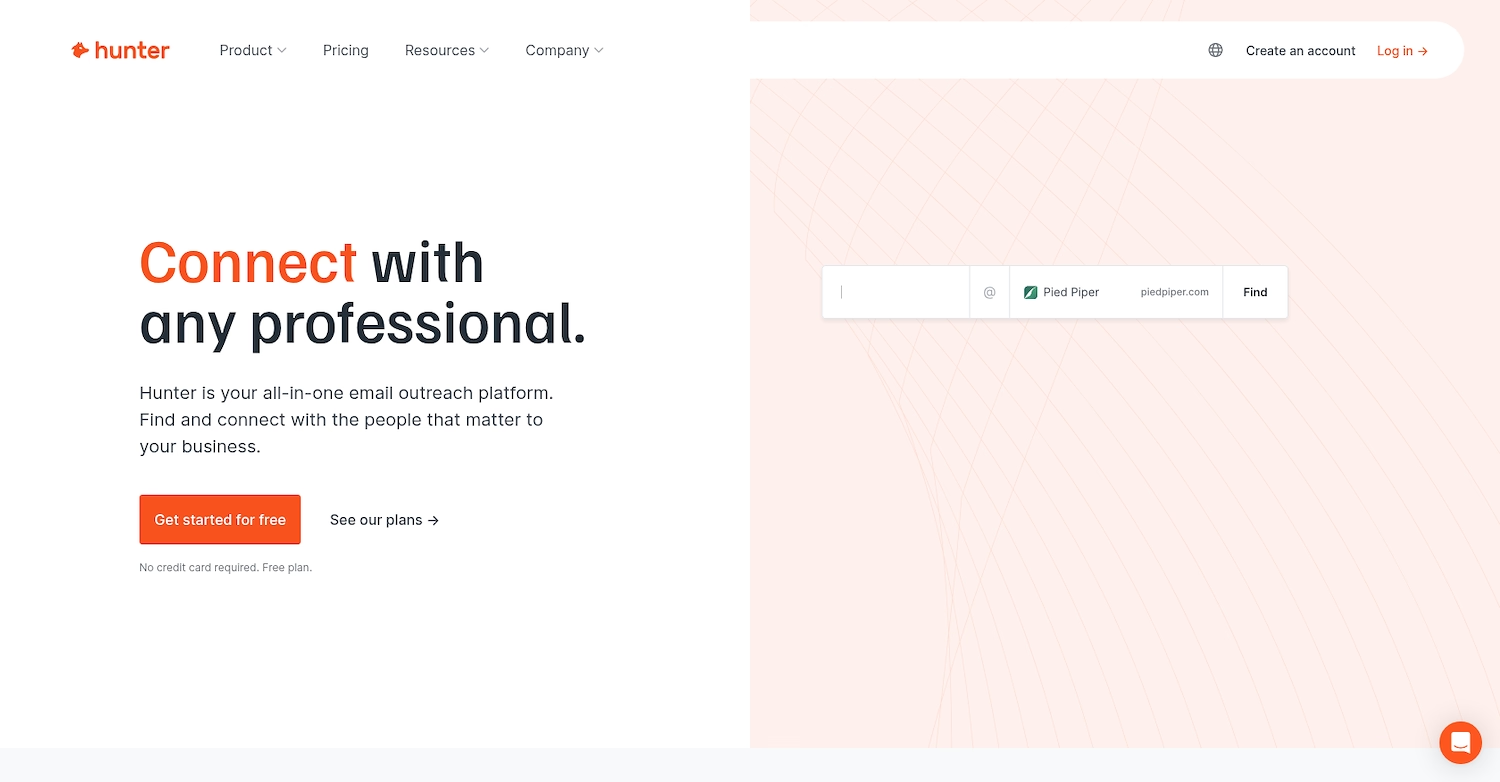
Hunter is a platform to find professional email addresses. It functions as an email finder and helps build a B2B database. The tool provides data enrichment and technographics to give context on prospects. Users can search for contacts by company domain or look for specific individuals.
Hunter's Main Features
- Fetches company-wide contact lists from a specific domain or company name.
- Checks email deliverability in bulk to reduce bounce rates and protect sender reputation.
- Composes and personalizes cold-email sequences with automated follow-ups and native sending from Gmail or Outlook.
- Lists web domains based on their technology stack to identify prospects using specific tools.
Hunter vs. Clearbit: A Comparison
Average Review score: 4.4/5 stars based on 592 G2 reviews.
- Hunter includes a built-in platform to send cold email campaigns. This is different from Clearbit, which focuses on data enrichment and does not offer outreach tools.
- The tool provides bulk email verification to help maintain a low bounce rate. While Clearbit enriches data with verified emails, it does not offer a separate bulk verification function for outside lists.
- It finds all email addresses connected to a company domain. This approach differs from Clearbit, which usually enriches data for specific, known contacts or companies.
- The platform offers a free plan and clear pricing tiers. This makes it accessible for smaller teams, unlike Clearbit's custom quote model designed for enterprise use.
Where Hunter May Fall Short
- Hunter focuses mainly on finding email addresses. Compared to Clearbit, it may offer less detailed company information, such as in-depth firmographics or technographics that sales teams often need for account research.
- The tool's data comes from web crawling. Some users find this can result in less current information compared to Clearbit, which emphasizes real-time data enrichment to reflect recent company changes.
- For teams that need custom data workflows, Clearbit provides a more flexible API. Hunter's integrations are more standard, which might limit complex or highly specific data enrichment tasks inside other applications.
Pricing and Cost-Effectiveness
Hunter offers transparent pricing with a free plan and paid tiers starting at $49 per month. In contrast, Clearbit uses a custom quote-based model, making Hunter a more predictable option for teams with fixed budgets. For the most current details, check the pricing on Hunter's official website.
5) Cognism
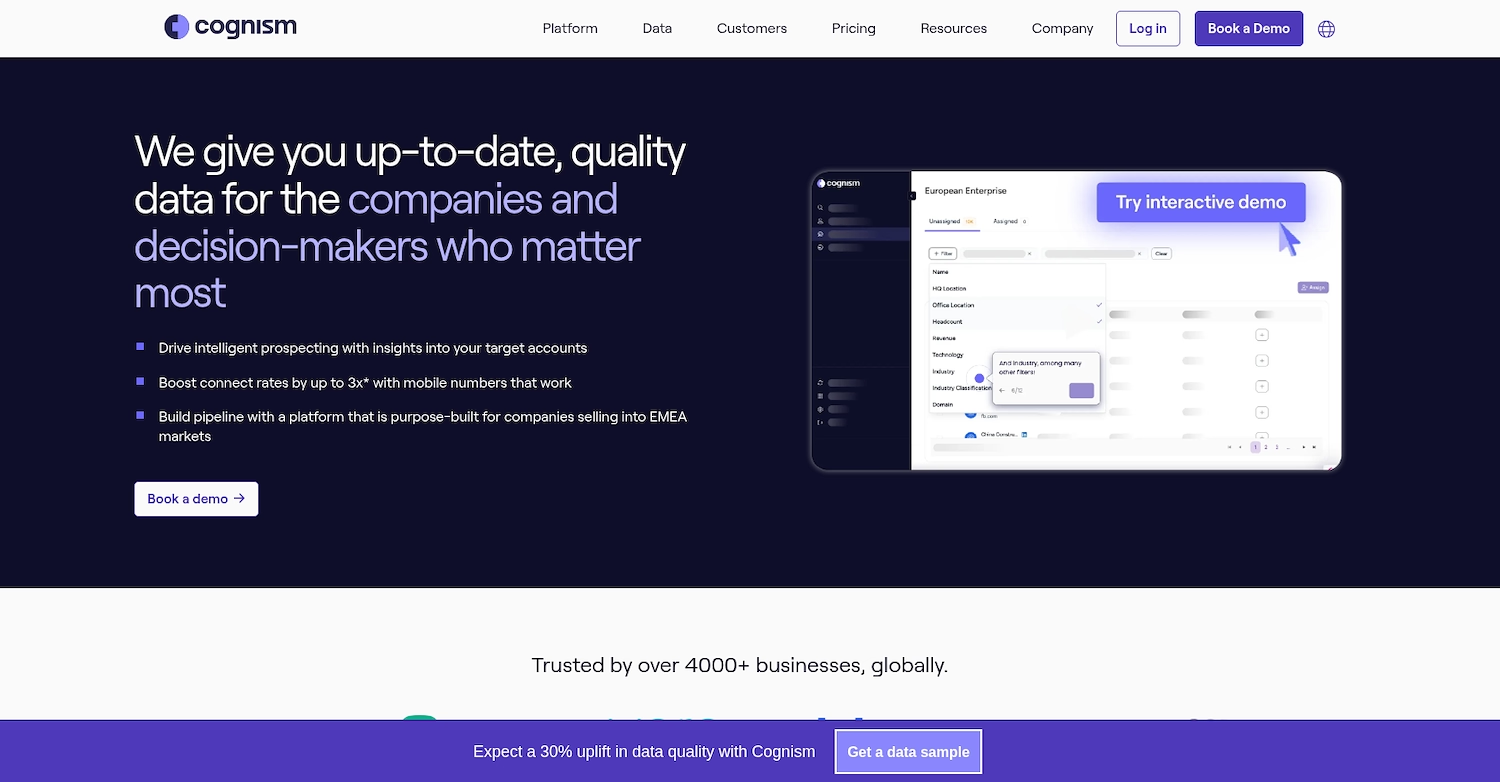
Cognism is a sales intelligence platform with globally compliant contact data. Sales and marketing teams use its B2B database, data enrichment, and technographics to find prospects. The platform includes an email finder to locate specific contact details for outreach campaigns.
Teams use the tool to build accurate prospect lists and connect with decision-makers. Its focus on compliance helps users adhere to international data privacy regulations.
Cognism's Main Features
- Offers phone-verified mobile numbers, called Diamond Data®, to reduce misdials and increase connect rates.
- Surfaces buying signals from hiring trends, funding rounds, and technographic changes for timely outreach.
- Provides extensive coverage of mobile numbers and email addresses for contacts based in the UK and EMEA.
- Maintains a database of VP-level and above contacts, screened against Do-Not-Call lists for compliant outreach.
Cognism vs. Clearbit: A Comparison
Average Review score: 4.6/5 stars based on 1,033 G2 reviews.
- Cognism provides phone-verified mobile numbers, known as Diamond Data®, to help increase connect rates. Clearbit also enriches contact data but does not offer this specific level of phone verification.
- The platform offers extensive data coverage for contacts in the UK and EMEA regions. This is a key difference from Clearbit, which has a more general global focus.
- It surfaces buying signals based on hiring trends and recent funding. This proactive approach to lead generation differs from Clearbit, which primarily enriches data on demand.
- The tool screens its contact database against global Do-Not-Call lists. This focus on compliance helps teams adhere to data privacy regulations, a feature not highlighted in Clearbit's core offering.
Where Cognism May Fall Short
- For custom data workflows, Clearbit offers a more developer-friendly API. Some users find Cognism's advanced functions have a steeper learning curve, which can complicate specific integration tasks.
- The tool's data strength is in the EMEA region. Compared to Clearbit, its real-time data for other markets might sometimes be less comprehensive, which could affect teams with a different geographic focus.
- Its platform includes a full suite of sales intelligence tools. Teams that require only data enrichment may find Clearbit's focused approach a better fit, as it avoids the complexity of a multi-function system.
Pricing and Cost-Effectiveness
Both Cognism and Clearbit use a custom quote-based pricing model, positioning them as high-cost solutions. User reviews suggest Cognism may offer a faster return on investment at 10 months compared to Clearbit's 11 months. You will need to contact their sales teams for specific pricing.
Consider 11x for Digital Sales Work
If your goal is to automate sales tasks with digital workers, 11x offers a different model. Its autonomous agents manage prospect discovery and lead qualification. This system can support teams that want to add specific automated functions to their sales operations.
With 11x, we use AI agents to manage your sales playbook. Alice finds accounts and runs outreach, while Julian qualifies inbound leads and books meetings. The platform consolidates your GTM stack, removing the need for multiple separate tools.
Book a demo to see 11x in action.
6) SalesIntel
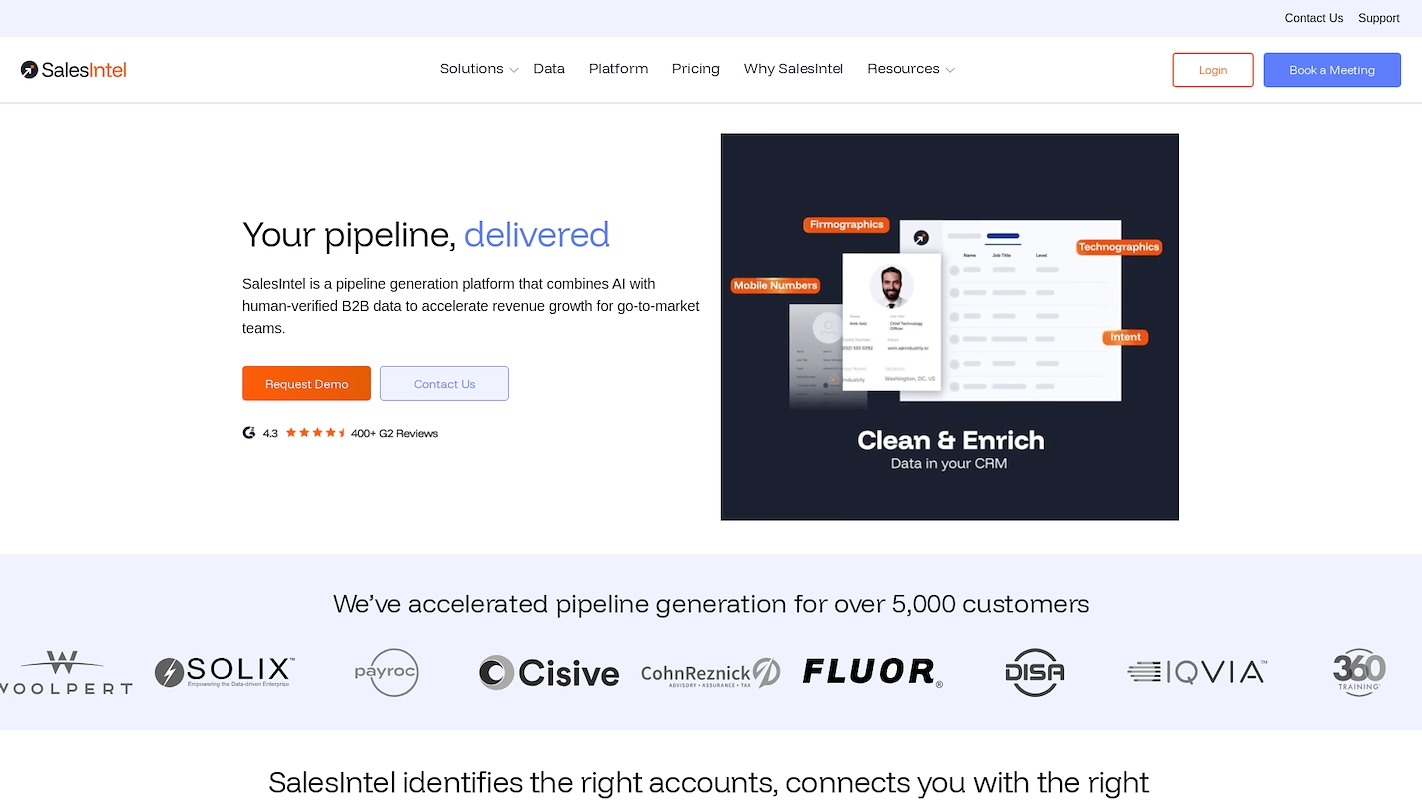
SalesIntel provides a B2B database with human-verified contact and company data. The platform includes technographics and supports data enrichment for existing CRM systems. Sales and marketing teams use it to source contacts and identify anonymous website visitors.
Its data includes direct-dial phone numbers and verified emails, with a stated goal of 95% accuracy to improve outreach efforts.
SalesIntel's Main Features
- Requests human-verified data for contacts not in the database with a Research-on-Demand service.
- Builds an evidence-based Ideal Customer Profile to prioritize accounts that match ICP characteristics.
- Automates signal monitoring, task routing, and outreach preparation using AI agents.
- Launches targeted ad campaigns to in-market accounts through the AdsIntel module.
SalesIntel vs. Clearbit: A Comparison
Average Review score: 4.3/5 stars based on 462 G2 reviews.
- SalesIntel offers a Research-on-Demand service to find human-verified contacts not in its database, a feature Clearbit does not provide.
- It uses a 90-day refresh cycle with human verification to maintain data accuracy, which is a different approach from Clearbit's real-time automated enrichment.
- The platform includes an AdsIntel module to launch targeted ad campaigns to specific accounts, a function outside of Clearbit's core data services.
- This tool provides unlimited enrichment credits for users. This contrasts with Clearbit's pricing, which is typically tied to usage volume.
Where SalesIntel May Fall Short
- SalesIntel uses a 90-day human verification cycle for its data. In contrast, Clearbit provides real-time data enrichment, which may better reflect very recent company changes for fast-moving accounts.
- For teams that require highly custom data workflows, Clearbit offers a more developer-friendly API. SalesIntel's integrations are more standard, which might limit certain bespoke data tasks inside other applications.
- The platform's broad feature set includes an ad module and AI agents. Teams that only need data enrichment may find Clearbit's focused approach is a simpler solution that better fits their specific needs.
Pricing and Cost-Effectiveness
Both SalesIntel and Clearbit use custom quote-based pricing. While we've covered key features and use cases in this comparison, pricing models can vary significantly between tools. For the most accurate and up-to-date pricing information, we recommend visiting SalesIntel's official website.
7) Demandbase Sales Intelligence Cloud
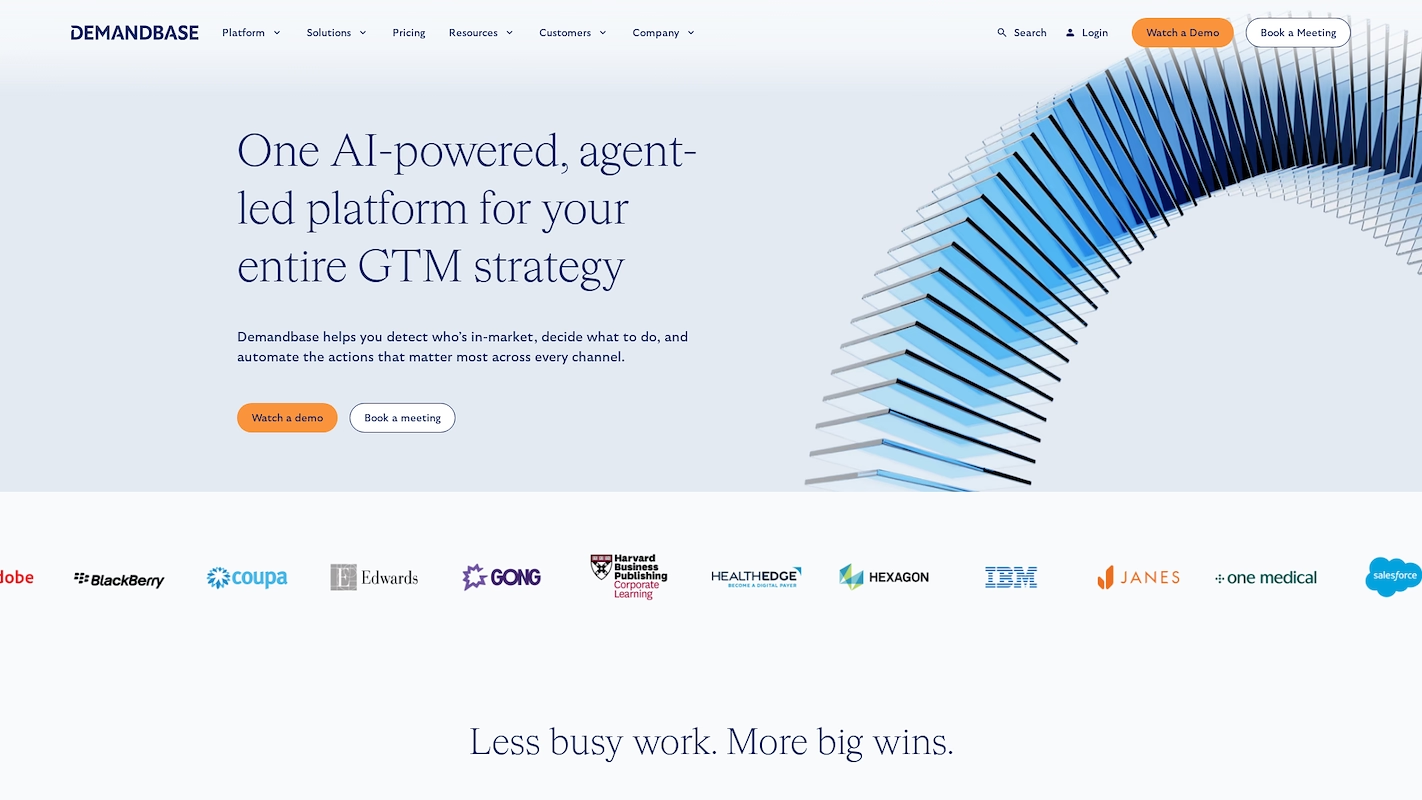
Demandbase Sales Intelligence Cloud is an account intelligence platform for B2B companies. It provides a B2B database with company and contact details. Sales teams use the platform for data enrichment and to see a prospect's technology stack. The tool also functions as an email finder to support sales outreach.
Demandbase Sales Intelligence Cloud's Main Features
- Generates an AI-ranked list of in-market accounts and filters them by region, product interest, and buying stage.
- Visualizes complete buying groups to highlight engaged decision-makers and identify who needs nurturing.
- Tracks anonymous and known account activity across your website and campaigns to summarize top engagement and intent signals.
- Sends real-time Slack notifications for spikes in account engagement or changes in deal momentum.
Demandbase Sales Intelligence Cloud vs. Clearbit
Average Review score: 4.4/5 stars based on 1,843 G2 reviews.
- Demandbase Sales Intelligence Cloud provides an AI-ranked list of in-market accounts, which is different from Clearbit's focus on enriching data for specific, pre-identified companies.
- It visualizes complete buying groups to identify key decision-makers, offering a more relational view compared to Clearbit, which typically provides individual contact details.
- The platform tracks account activity across your website to summarize engagement, a feature for monitoring intent that is outside Clearbit's core function of data enrichment.
- It sends real-time Slack notifications for spikes in account engagement, offering immediate alerts that differ from Clearbit's updates on company firmographics.
Where Demandbase May Fall Short
- Some users report a steep learning curve due to the platform’s complexity. In comparison, Clearbit offers a more developer-friendly API that can simplify custom data workflows for teams with specific technical needs.
- The tool is a comprehensive account-based marketing platform. For teams that only require data enrichment, Clearbit presents a more focused solution without the additional features that might complicate a simple workflow.
- Its contact information for certain roles can sometimes be incomplete. Clearbit, with its dedicated focus on real-time data enrichment, may provide more consistently complete contact profiles for specific queries.
Pricing and Cost-Effectiveness
Both Demandbase Sales Intelligence Cloud and Clearbit use a custom quote-based pricing model, positioning them as high-cost solutions. Based on user reviews, Clearbit may offer a faster return on investment at 11 months compared to Demandbase's 13 months. You will need to contact their sales teams for specific pricing details.
8) Seamless.AI
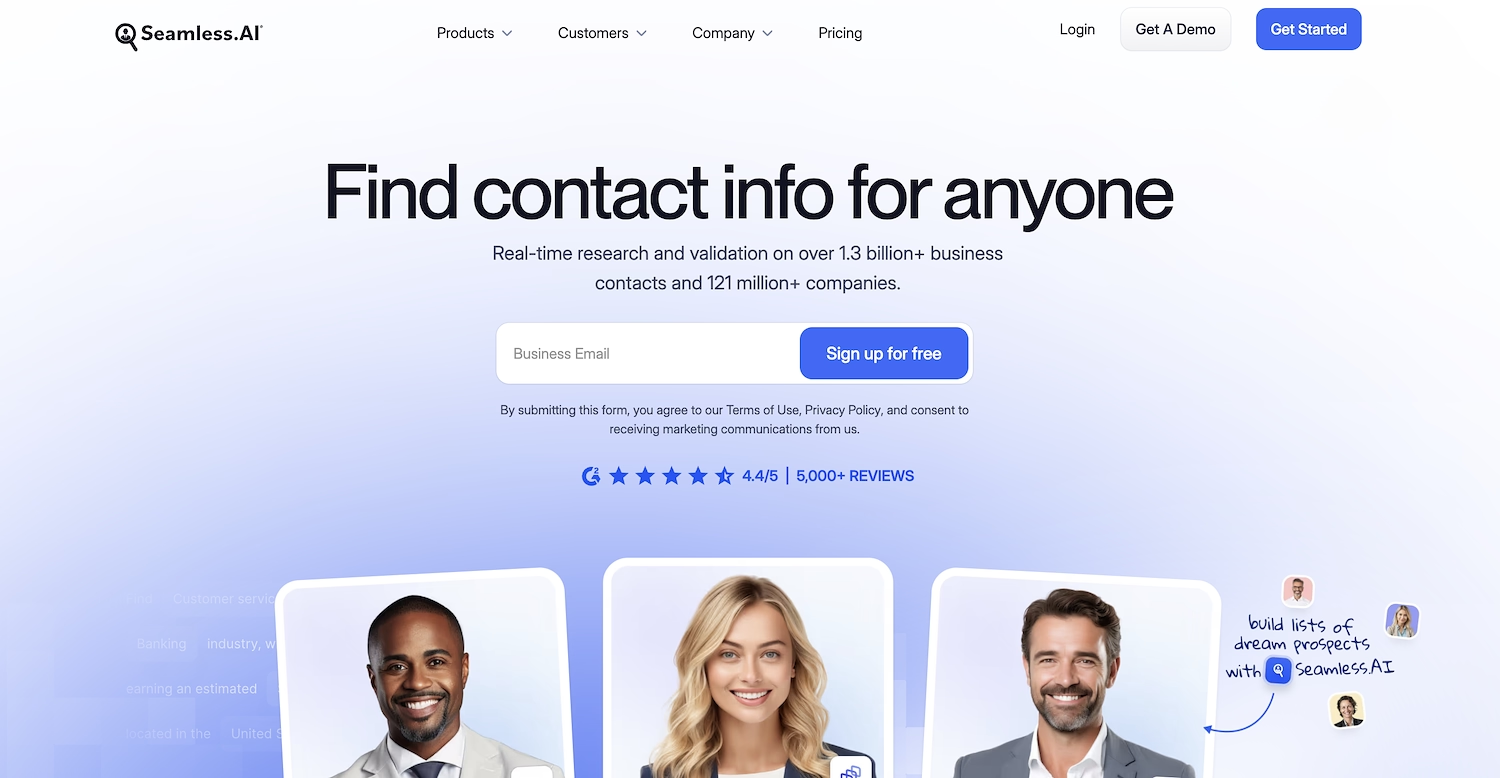
Seamless.AI is a sales intelligence platform that uses a real-time search engine for its B2B database. The tool provides contact and company data, offers technographics, and supports data enrichment. Sales and marketing teams use the platform to find contacts, build prospect lists, and source email addresses for outreach.
Seamless.AI's Main Features
- Builds prospect lists using a real-time search engine with access to over 1.7 billion contacts.
- Monitors buyer intent signals and job changes to identify timely sales opportunities.
- Validates lead information to improve data quality before it enters a CRM.
- Cleans and enriches existing data to maintain accurate records within integrated systems.
Seamless.AI vs. Clearbit: A Comparison
Average Review score: 4.4/5 stars based on 5,067 G2 reviews.
- Seamless.AI uses a real-time search engine to build new prospect lists. This is a different approach from Clearbit, which focuses on enriching data for specific, known accounts.
- The platform monitors buyer intent signals and job changes to identify timely sales opportunities. In contrast, Clearbit's main function is to provide firmographic data on demand.
- It validates lead information before it enters a CRM to help maintain data quality. Clearbit typically enriches existing records directly within integrated systems.
- This tool offers free credits, which provides a different value proposition for teams. Clearbit operates on a custom, quote-based model without a similar trial system.
Where Seamless.AI May Fall Short
- Some users report that Seamless.AI's contact data can occasionally be inaccurate. In comparison, Clearbit's specific focus on real-time data enrichment may provide more current information for fast-moving accounts.
- For teams that need custom data workflows, Clearbit offers a more flexible, developer-friendly API. Seamless.AI's standard integrations might not support highly specific or complex data enrichment tasks.
- The platform is a broad sales intelligence tool. For teams that only require data enrichment, Clearbit presents a more focused solution that can be simpler to implement without additional features.
Pricing and Cost-Effectiveness
Both Seamless.AI and Clearbit use a custom quote-based pricing model. User reviews suggest Seamless.AI may offer a faster return on investment at 9 months compared to Clearbit's 11 months. For the most accurate pricing, visit Seamless.AI's official website.
9) LeadIQ
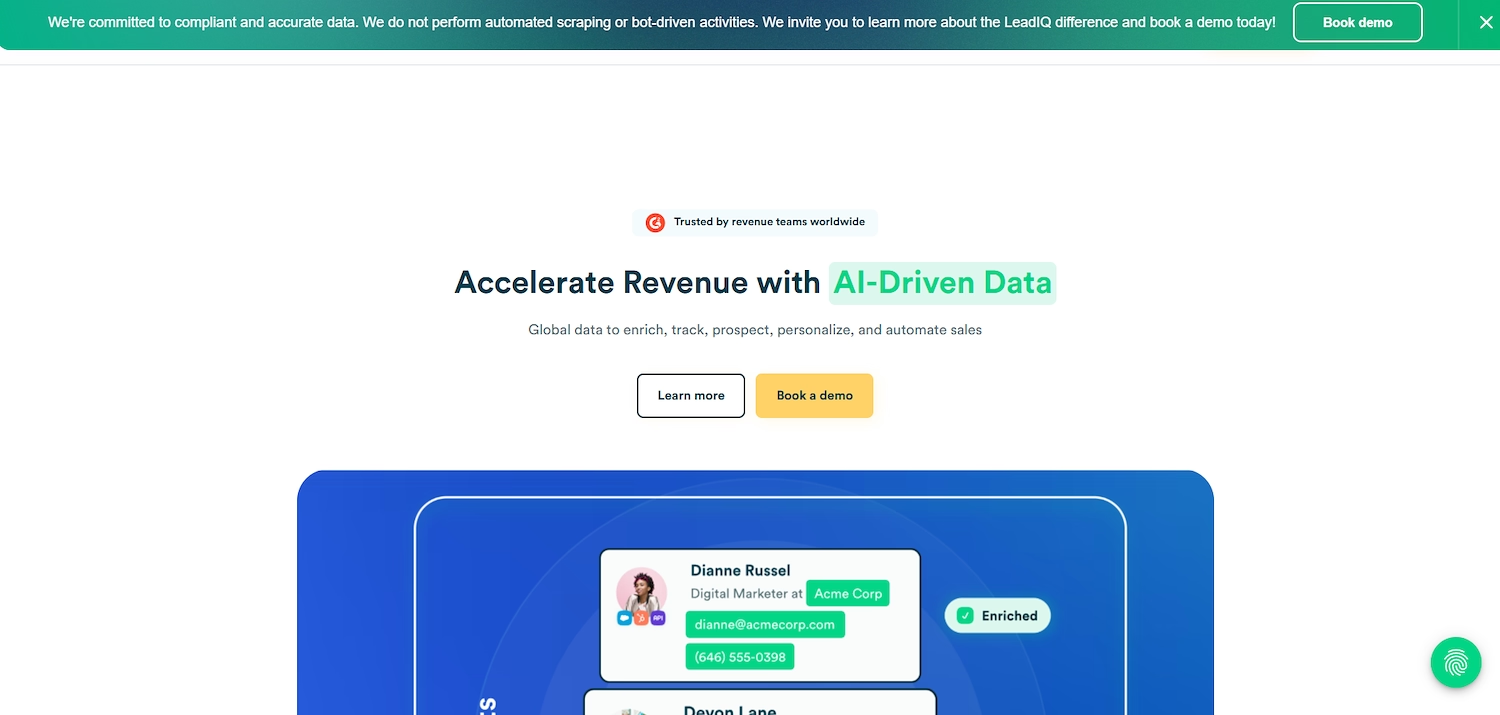
LeadIQ is a sales prospecting platform for capturing contact data. Sales teams use it to find verified email addresses and phone numbers from social profiles. The tool helps build prospect lists and supports top-of-funnel activities for sales representatives.
LeadIQ's Main Features
- Captures contact data from social profiles and websites using a browser extension.
- Verifies email addresses and phone numbers in real-time at the point of capture.
- Syncs lead information directly to CRM and sales engagement platforms like Salesforce and Outreach.
- Tracks job changes for saved prospects to identify timely outreach opportunities.
How LeadIQ Compares to Clearbit
Average Review score: 4.2/5 stars based on 1,097 G2 reviews.
- LeadIQ allows sales reps to capture contact data from websites with a browser extension. This active prospecting workflow differs from Clearbit, which automatically enriches a database in the background.
- It provides real-time verification for contact data at the point of capture. This gives sales reps immediate confirmation for a specific lead, while Clearbit offers real-time enrichment across an entire system.
- The tool offers transparent, per-user pricing with a free plan. This model provides predictable costs for teams, unlike Clearbit's custom, quote-based model that is tied to data volume.
- Its platform helps sales representatives capture individual contact details from social profiles. Clearbit, in comparison, provides more comprehensive company-level data, such as firmographics.
Where LeadIQ May Fall Short
- LeadIQ focuses on capturing individual contact details, which might result in less comprehensive company-level data. In comparison, Clearbit provides in-depth firmographics and technographics for a broader account view.
- Its manual capture process can be less efficient for large-scale data projects. Clearbit's automated enrichment is often better suited for updating thousands of records at once without manual intervention.
- For teams that need custom data workflows, Clearbit offers a more flexible API. LeadIQ's standard integrations might not support highly specific or complex data enrichment tasks within other applications.
Pricing and Cost-Effectiveness
LeadIQ offers transparent pricing with a free plan and paid tiers starting at $45 per user per month, providing predictable costs for teams. In contrast, Clearbit uses a custom quote-based model that may better suit large enterprises with specific data volume needs. For the most current details, visit LeadIQ's official website.
10) Datanyze
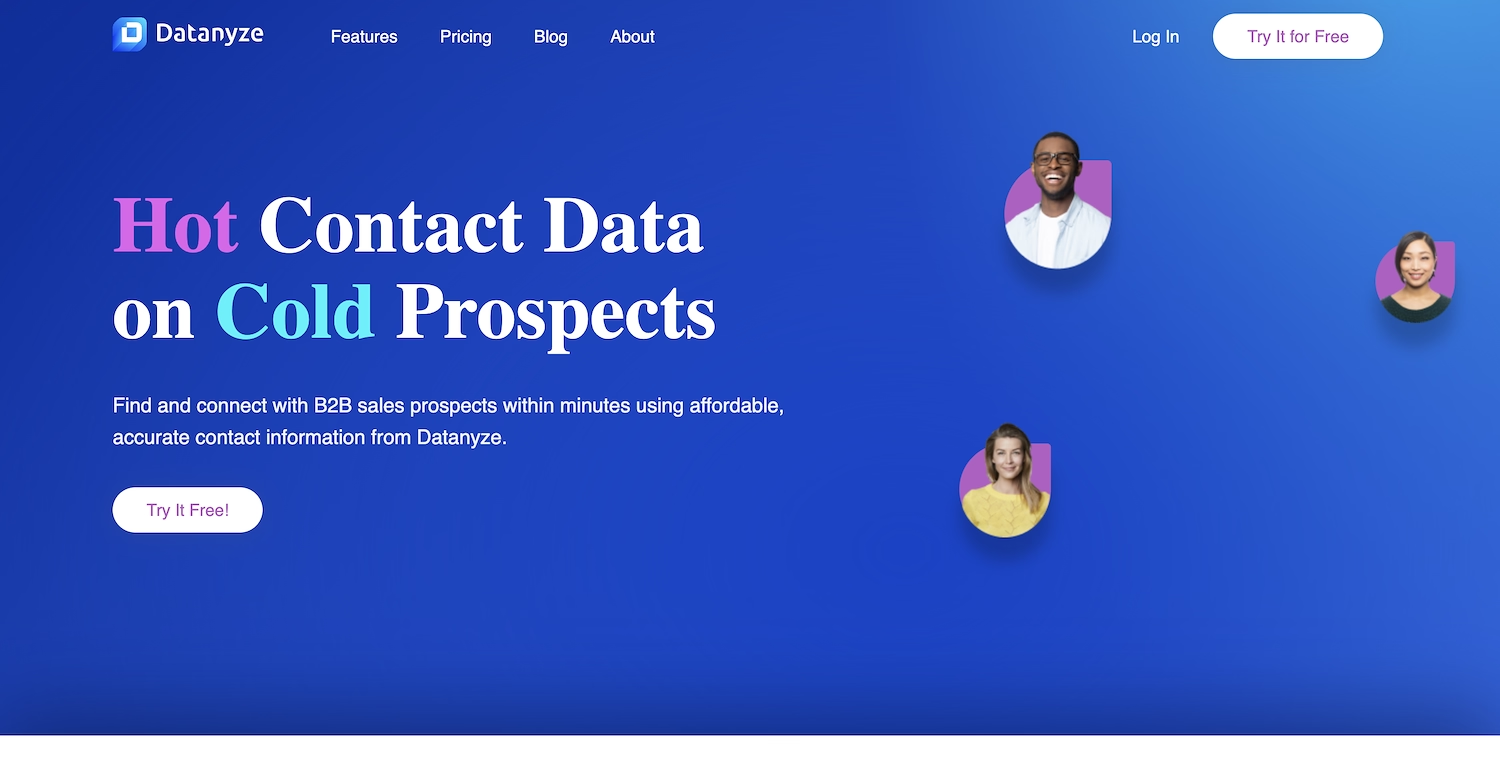
Datanyze is a platform for sales and marketing teams. It provides technographics and data enrichment to support prospect research. The tool functions as an email finder and helps build a B2B database with contact information. Users can identify the technology stack of potential customers to inform their outreach strategy.
Datanyze's Main Features
- Supplies contact information, including emails and direct dial numbers, from LinkedIn profiles via a Chrome extension.
- Provides access to a database of over 48 million direct dial numbers and 84 million email addresses.
- Offers industry research capabilities to help identify and understand market segments.
Datanyze vs. Clearbit: A Comparison
Average Review score: 4.1/5 stars based on 445 G2 reviews.
- Datanyze offers a Chrome extension to find contact information directly from LinkedIn profiles. This workflow differs from Clearbit, which primarily enriches data automatically in the background.
- The tool provides transparent pricing with a free plan and monthly tiers. This offers more predictable costs for teams compared to Clearbit's custom, quote-based model.
- It includes industry research features to help identify and understand market segments. Clearbit, in contrast, focuses more on enriching data for specific, known companies.
- Datanyze gives access to a database with stated figures, like over 48 million direct dial numbers. This provides a clear scope of data, while Clearbit's model is based on API calls for enrichment.
Where Datanyze May Fall Short
- Datanyze focuses on finding contact details like emails and phone numbers. Some users may find its company-level data, such as detailed firmographics, is less comprehensive compared to Clearbit's real-time enrichment.
- Its primary workflow involves manual data capture through a browser extension. For large-scale database updates, this process can be less efficient than Clearbit’s automated enrichment that works across an entire system.
- The tool's integrations are more standard. For teams that need custom data workflows, Clearbit offers a more flexible, developer-friendly API that supports highly specific tasks.
Pricing and Cost-Effectiveness
Datanyze offers transparent pricing with a free plan and a paid tier starting at $55 per month, making it a predictable option for teams with fixed budgets. In contrast, Clearbit uses a custom quote-based model that may better suit large enterprises. For the most current details, visit Datanyze's official website.
Which One Should You Go With?
Choosing a Clearbit alternative depends on many factors, including your budget, team size, and specific data needs. This guide reviewed several options to help you create a shortlist and make an informed decision.
If your goal is to automate sales functions rather than just enrich data, consider 11x. Its AI agents can manage parts of your sales process, from finding prospects to qualifying inbound leads, offering a different approach to building your GTM stack.




